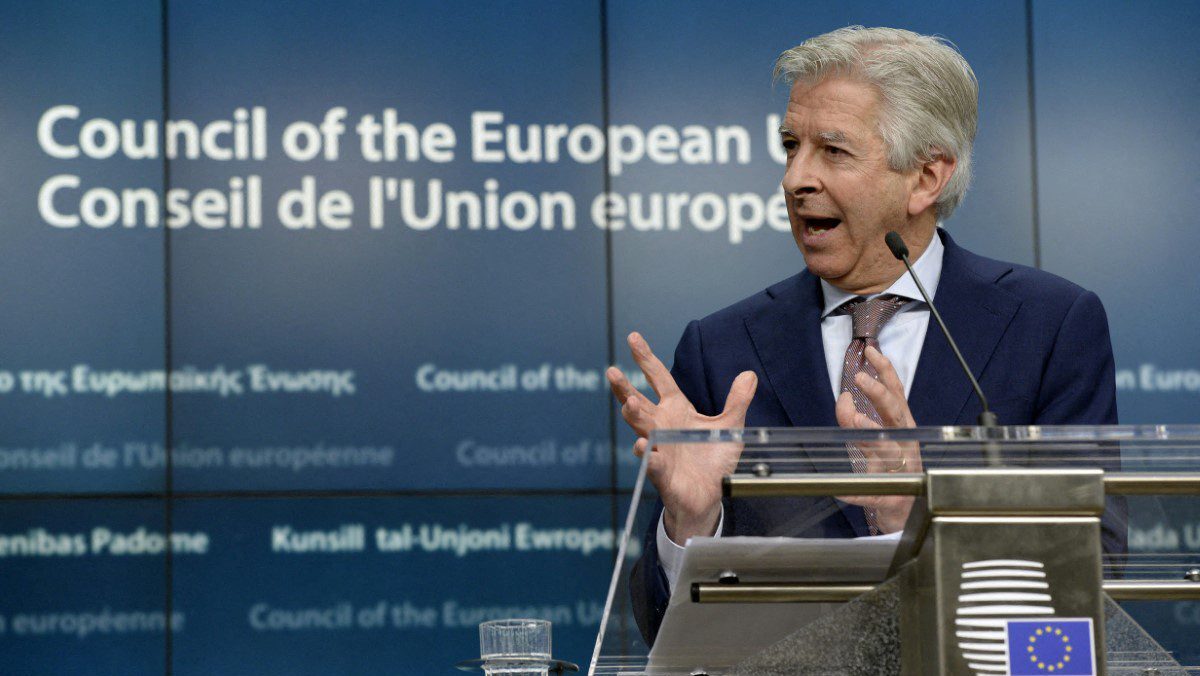
Coalition negotiator Ronald Plasterk speaking as the Dutch Interior Minister at the end of an ‘Extraordinary meeting of ministers for Justice and Security and representatives of the EU institutions’ at the European Council headquarters in Brussels.
Photo: THIERRY CHARLIER / AFP
Ronald Plasterk, newly appointed to lead the Dutch coalition talks, appears to have his work cut out for him after the three largest potential coalition parties said no to forming a government with Geert Wilders’ PVV.
Plasterk, who is replacing the previous negotiator who abruptly resigned Monday, spoke on Wednesday, November 29th, with the leaders of the largest parties following last week’s Dutch elections.
While Geert Wilders’ PVV party took around 24% of the vote in last week’s election, it still needs partners to form a coalition government.
The two largest right-leaning parties that Wilders hopes to work with—outgoing Prime Minister Mark Rutte’s VVD party and the newcomer NSC—said they are not willing to enter coalition talks with him, thereby dashing his hopes of a majority government.
NSC leader Pieter Omtzigt told Dutch media after his talk with Plasterk that his party was not ready to start negotiating on forming either a majority or minority government.
Omtzigt reiterated that he still has reservations about working with the PVV, as he felt the PVV would first have to clarify what it meant by saying that it had ‘shelved’ some of its demands. “Among other things, there are obstacles in the sphere of the rule of law,” he said, a reference to allegations that the nationalist PVV, known for its critiques of Islam as an ideology, is intent on deporting Muslim citizens once in power. Omtzigt, then, placed the ball in Wilders’ court.
Wilders emphatically denied having any such intent, since his party is “there for all Dutch citizens, be they Christians, Muslims, or non-believers.”
Plasterk met with Wilders first on Wednesday morning. During their talks, Wilders presented his wish for a coalition between his PVV, VVD, NSC, and the smaller agrarian populist Farmer-Citizen Movement (BBB), since cooperation between those parties would be a “logical center-right combination.” Were these parties to be put together, they would command an impressive majority in both houses of the Dutch parliament.
Wilders himself prefers a majority cabinet. To facilitate this, he called on all parties to:
Go talk to each other. Remove all obstacles, look for agreement on certain policies and whether you have faith in each other.
The PVV leader emphasized that his party will take a “firm but reasonable” stance and is open to compromise. A minority cabinet is, however, not a taboo as far as Wilders is concerned. “Anything is possible,” he said.
VVD leader Dilan Yesilgöz wants substantive negotiations to begin on forming a “center-right cabinet.” She repeated that her party would not join a Wilders cabinet, as the VVD is concerned with maintaining fiscal discipline as well as preserving good relations with international organizations such as NATO and the European Union.
The PVV is critical of NATO’s continued support to Ukraine and is proposing that the Netherlands leave the EU.
Instead, Yesilgöz added, the VVD would be willing to support a cabinet composed of PVV, NSC, and BBB, but “from parliament”—that is, giving ‘tolerance support’ without being part of the coalition.
Frans Timmermans, leader of the leftist GroenLinks-PvdA and the EU’s former climate pope, also spoke with Plasterk. He reiterated that his party will not cooperate with the PVV in a coalition, citing, like the NSC, the party’s “exclusion of groups of Dutch citizens.”
Timmermans, who has been open about his wish to become prime minister, added that now is not his turn and that Wilders, as leader of the largest group, should take the initiative in the new cabinet’s formation. He also commented that he considers Wilders’ preferred coalition “a clear reflection of the election result.”
Plasterk will continue his assignment on Thursday, holding talks with the party leaders of the smaller parties (D66, BBB, CDA, SP, FVD, and PvdD). Plasterk hopes to have seen his assignment through by Tuesday next week.
With the three other major parties not willing to enter into a cabinet with Wilders, talks are expected to drag on for a good while.
If the previous Dutch national election of March 2021—the talks of which took a record-breaking 299 days before a government was formed— is anything to go on, this one might be even more lengthy.
